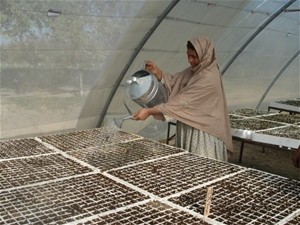
“My earnings at the nursery aren’t huge but they bring us a peace of mind. At last my husband and I can sleep at night since we no longer have to cultivate poppy so our children can go to school,” Shah Jan, Co-owner of a plug seedlings enterprise, Nangarh
DAI
USAID assists women-owned businesses to generate alternative income for families depending on the opium industry
5 FEBRUARY 2007 | BATIKOT DISTRICT, NANGARHAR PROVINCE
Bitter feelings about going against law and the Qur’an aside, Shah Jan and her husband used to grow poppy so they could send to school their seven children. This winter, however, the farmer’s family will not be planting poppy. For several months now, Shah Jan has been working at developing a modest yet consistent and honest alternative; income earned from a commercial plug seedling nursery in Batikot district of Nangarhar province.
Last summer, after joining a self-help group and receiving training in basics of crop cultivation, Shah Jan and other women from her district rented a plot of land and set up a small seedling production nursery. Rapidly, the women-owned enterprise has proven to be cost-effective.
By implementing modern technologies at their greenhouse, Shah Jan and her associates grow short-cycle varieties, which can be harvested up to four weeks earlier than traditional varieties available in the region. The plug seedlings they produce also have less transplanting shock, than the traditional field nursery grown bare root transplants. Due to their competitive edge, as well as low production costs maintained at the greenhouse, the women-owned businesses help eastern region growers meet the demand and quality standards of high-value produce markets.
The nursery is one of five women-owned plug seedling enterprises created and supported by the USAID-funded Alternative Livelihoods Program for the Eastern Region (ALP/E). The gender and micro-enterprise component of the ALP/E has provided vocational and business skills, greenhouses, seeds and fertilizers, as well as technical advice, enabling women like Shah Jan to generate licit income and reduce their households’ dependence on the opium industry.







Comment
Make a general inquiry or suggest an improvement.